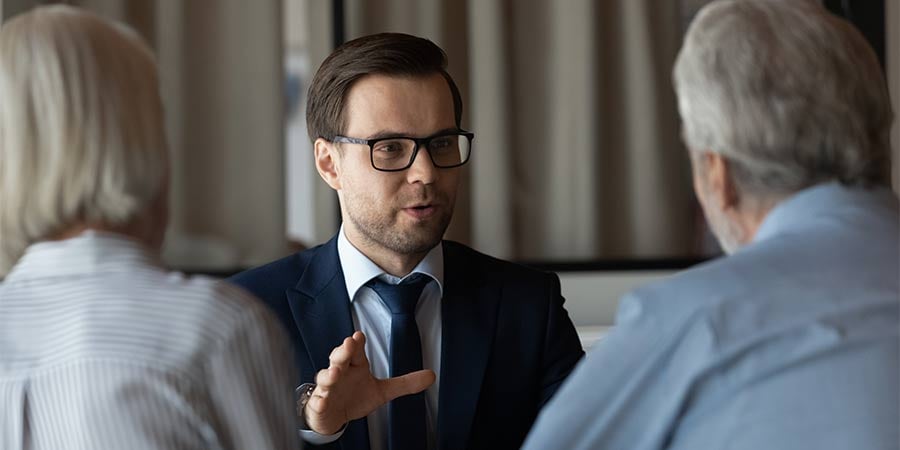To achieve different outcomes inside the sales conversation, you need to ask different questions. Because it is helpful to be One-Up, I ask questions designed to help the client see something that was previously invisible to them. We call these power questions because they accomplish something that isn't easy to achieve with other types of questions. They define you as a salesperson and are often open-ended.
For decades salespeople have been taught to ask open-ended and closed-ended questions. An open-ended question is one that can't be answered with any one-word answer. This type of question requires the person to think about the answer, explain their views, or tell you about their experiences. A closed-ended question is one that the contact can answer with a single word, like yes, no, or a number. While you need to use closed-ended questions to gain basic information, your open-ended questions will yield deeper discovery that helps you understand your client on a strategic level.
The better your questions, the better your sales results. Questioning is a sales skill most salespeople need to improve to close more deals, especially with large, complex clients. It also improves sales engagement.
When Do You Use an Open-Ended Question?
You want to use an open-ended question in the sales conversation when you need to acquire detailed or strategic information from your contacts. The fact that the question requires more than a one-word response requires your contact to provide you with more information, the information you need to help them improve their results.
Open-ended questions are also helpful because they often provide information that wasn't part of the question. The more your contact talks, the more context you capture.

A closed-ended question might get you the information you need, but it will not provide the context. "You are using the XC500 from XC services. Is that right?" When your client says, "Yes, that is correct," you have confirmed something you already knew.
An open-ended question would accomplish more. "Can you share with me your experience with the XC500 and the other equipment you have used in the past, so I can understand how you operate?” I like soft language like "can you share" because it prevents a poor sales experience by making the conversation feel more consultative and collaborative.
The contact answering this question will share their experience with the XC500, other equipment, and how they use it. As a bonus, your contact might blurt out, "Let me get Susan to join us, because she can answer this better than I can." And just like that, your contact has identified their subject matter expert and provided you access.
How to Extract More Information by Using Open-Ended Questions
My friend John Spence gave me a strategy for getting a contact talking. To get more information, you ask the open-ended question by saying, "Take five minutes and tell me about your past experiences: what worked, what didn't work, and what you believe to be most important to you and your results now." As the contact is talking, you are taking notes. When your contact answers the open-ended question, you follow up by asking another open-ended question about something they mentioned that requires more context. It's something like, "Can you tell me more about the equipment failure during your peak season and what happened?"

You may also need to put constraints on the open-ended questions when you have a contact who already provides answers that are long. This is one danger of asking open-ended questions. John would tell you to ask something along the lines of, "Can you give me the two-minute story about what happened and why it occurred?" If you need more information, you can always ask another open-ended question.
The Worst Possible Open-Ended Questions
One salesperson I know asked their contact, "Can you tell me about what your company does?" It was a short conversation, as the salesperson failed their audition in the first 10 seconds of the sales conversation. That must be a record. I use this example to emphasize that you should never ask an open-ended question that you should already know the answer to. Every salesperson should know what a prospective client does before sitting down with them.
Asking your client an open-ended question about what kind of problems they are having is almost as bad. Unless it's your third day on the job, you should already know what outcomes your client is trying to improve and what problems are causing their poor results.

The same is true of questions about the implications of the client's poor results. Instead of asking open-ended questions, you will better position yourself by saying, "My guess is you are having this problem and, like some of our clients, you are experiencing these negative outcomes. How close was I, and what did I miss?"
"What did I miss?" is an open-ended question. I like this question set-up because it proves you are an expert and authority at the beginning, but it also allows you to learn something that might help you better support your contact and win their business.
Open-ended questions are an important part of the sales conversation because they can help you acquire more information, get a contact thinking about their problem from a new perspective, and position yourself as an expert and authority. However, remember to never ask an open-ended question about something you should already know the answer to, and feel comfortable putting constraints around your question when the contact provides answers that are long-winded. By knowing how and when to use open-ended questions, you can ensure you and your client get the most out of your sales conversations.
If I asked you if this post helped you, you could answer yes or no. If I asked you what open-ended questions you will use in your next sales call, you'd have a lot more to say.












